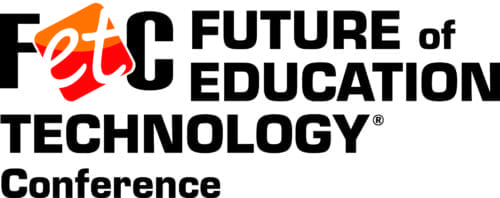 The 2019 Future of Education Technology Conference (FETC) will take place in Orlando, Florida, from January 27-30. In this Presenter Q&A Roundtable, a number of conference presenters share their perspectives on some of the compelling education questions of today. Read below to see what they shared, and to find out what sessions each will present at FETC.
The 2019 Future of Education Technology Conference (FETC) will take place in Orlando, Florida, from January 27-30. In this Presenter Q&A Roundtable, a number of conference presenters share their perspectives on some of the compelling education questions of today. Read below to see what they shared, and to find out what sessions each will present at FETC.
In your opinion, what is one of the most exciting edtech developments to look forward to in 2019?
Interoperability and the opportunities it will create in 2019 to focus on outcomes, not just technical connectivity. The need for data interoperability between education technology systems (SIS, LMS, EdTech Management, Curricular Tools, etc.) is becoming more necessary every year, thanks to the work of innovators like Project Unicorn, and the 400+ districts and providers participating. Data shows that school districts use more than 500 edtech tools per month on average, and as this number grows, so will the use cases for interoperability to expand beyond just “easy logins.” Soon, it will streamline rapid-cycle evaluation of tools and allow for more equitable personalizing of learning at scale. The need for product providers and consumers to have interoperable tools (beyond rostering) will soon be more than just a “check box” on a procurement process. It will become required for systems to see success, and that benefits education leaders, teachers and students alike.
Karl Rectanus, CEO of LearnPlatform
Big Data is one of the most exciting edtech developments for 2019. I know this worries many people in education, but the value here is immense and the dangers can easily be mitigated. The analysis of large data sets, be they academic or operational, can finally let us understand the 10,000 foot level of schools with the detail of knowing details about each tree. This will open discussions about improvement, learning, personalization, and effectiveness that, coupled with the glut of visualization tools, will give educators leverage to making lasting impact. And with GDPR, COPPA, and the anonymization of large data sets we can protect our students and teachers as we learn from them to improve systemically.
Matt Harris, International Education Consultant, International EdTech
I’m really excited about personalization for both students and teachers in 2019. “Personalized learning” is one of those buzzwords that constantly gets thrown around in edtech, but I truly don’t believe it has been nailed yet. With advances in AI and data analysis, edtech has the ability to serve up learning material that hits home at all levels of education. Some may see it as a way to just monitor student progress and learning ability but to me it’s a complete game-changer. In 2018, teachers quit their jobs at the highest rate on record; that’s an alarming stat, especially when you consider the increased population size year-after-year. Personalization can give students and teachers the ability to connect directly to the material at hand, target what is right for them in their own educational journey and set all of us up with a more productive and connected society. It’s ridiculous for a teacher to be expected to get the same results from his or her students in a classroom of 20+ when the material is the exact same for all students. Personalization has the ability to change all of that.
Monica Burns, EdTech & Curriculum Consultant, ClassTechTips
Touchscreens were first introduced to help people with disabilities access computers. Word prediction technology was first used to assist people with disabilities to cut down on the number of keystrokes necessary to complete a word when typing. People with disabilities have been using voice dictation and voice activated technologies for decades. All of these technologies are now commonplace, used by the masses. These are just three examples (there are many others) that show a common trend. Technologies designed for people with disabilities become mainstream because what is designed based on a need for a person with a disability is often a feature that is useful for all. With that trend in mind, in 2019 and beyond, educators can use this phenomenon to design instruction for the masses. Educators can examine the most frequently used accommodations. The functions of those accommodations can then be applied to the design of instruction for all. Specific accommodations once exclusively intended for an individual with a disability can now be used to design instruction inclusively for all.
Chris Bugaj, Inclusive Design Coach, Loudoun County Public Schools
I am so excited about the increased opportunities for inclusivity in all areas of education from Pre-k through higher ed. New and improved edtech and better wi-fi/ bandwidth with 5K continue to make education more accessible geographically and personally. Increased demand for inclusivity in websites, digital curriculum, presentations, social media, device features, etc. promise to increase capabilities of students with differing abilities everywhere creating endless possibilities!
Mia Laudato, Technology Resource Specialist, FDLRS Action Resource Center
I’m looking forward to learning more about how AI and VI and how it can be used in the classroom setting, particularly students with differing abilities.
Robin Williams, Human Resource Development Specialist, FDLRS Action Resource Center
Bonus responses from the LearnPlatform team: The following individuals won’t be presenting at FETC, but were generous enough to share their perspectives. LearnPlatform CEO Karl Rectanus will be presenting at FETC and you can find his schedule here.
Amanda Cadran, Director of Implementation & Customer Success:
Demand-side educator empowerment. As access to education technology continues to increase for students and educators, it is increasingly important that edtech leaders are confident they are using tools that are safe. My prediction for 2019 is that we will see a wave of empowerment on the part of educational innovators who are setting terms and conditions for their providers, and finding ways to manage that process efficiently across their organization.
Wesley Burt, Chief Product Officer:
Edtech will become specialized. As interoperability becomes more standard in the education space, school district leaders will have more, relevant, and meaningful data to inform decision making on education technology. This will enable them to better understand the context in which specific technologies are impacting specific students, and adjusting implementation and professional development around those specific contexts. As more and more districts take these actions, we’ll see market-wide trends that will force edtech providers to specialize in areas (i.e. certain populations of students, grade levels, school types, etc.) where their tools are actually effective.
Daniel Stanhope, Vice President of Research & Analytics:
- Alternative outcomes (e.g., SEL, 21st Century Skills) will continue to emerge as important measures of performance.
- Heightened push for data standards and interoperability.
- Increased reliance on data and evidence to inform decisions.
- Predictive analytics, AI, and machine learning will continue to be overhyped and will continue to deliver empty promises.
- Verdicts will be published around the value of personalized learning.
What is your number one education prediction for 2019 (and beyond)?
I think (and hope) that more schools will place more emphasis and have an intentional focus on learning more about trauma, ACEs, and stress and its impact on emotions and the developing brain. If indeed we do see an increase, the natural progression is that more schools will embrace a whole-child approach with SEL having a larger role in the landscape of schools across the nation. With this shift will come a broader acceptance of meditation as a must-have component for addressing students’ needs to overcome high-stress/high-trauma environments in which they live. Presently, meditation still has quite a stigma and is met with great resistance in different regions of the country. More education needs to be provided to help parents, communities and the school staff understand the research that supports meditation as a powerful tool to help manage stress for kids of all ages.
Tara Brown, “The Connection Coach,” President of Learner’s Edge Consulting
- FETC Blog – Big Things You’ll Experience at FETC 2019
- edCircuit – Meet Your Favorite EdTech Authors at FETC 2019 (Part 2)
- Getting Smart – 26 Can’t-Miss Education Conferences for 2019
